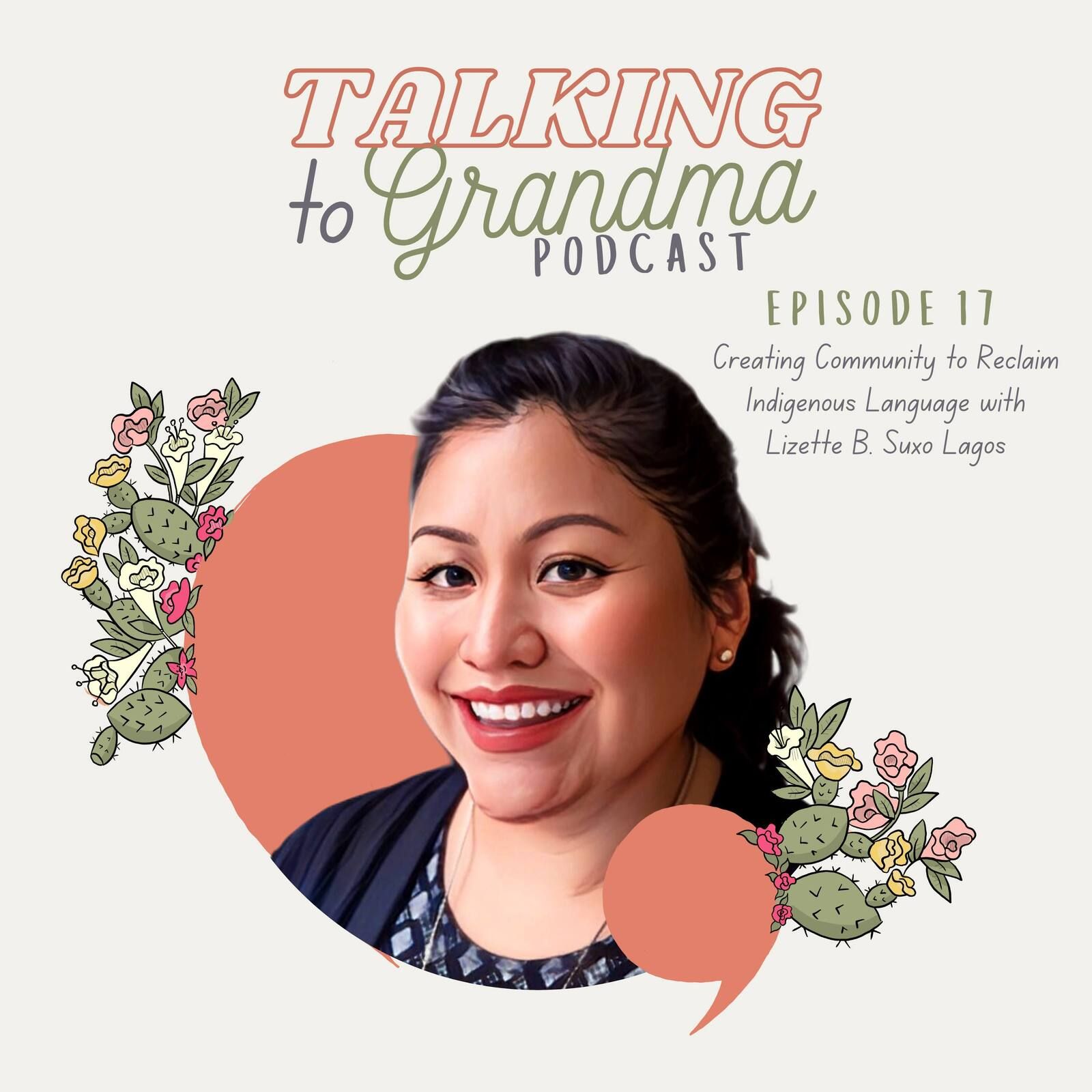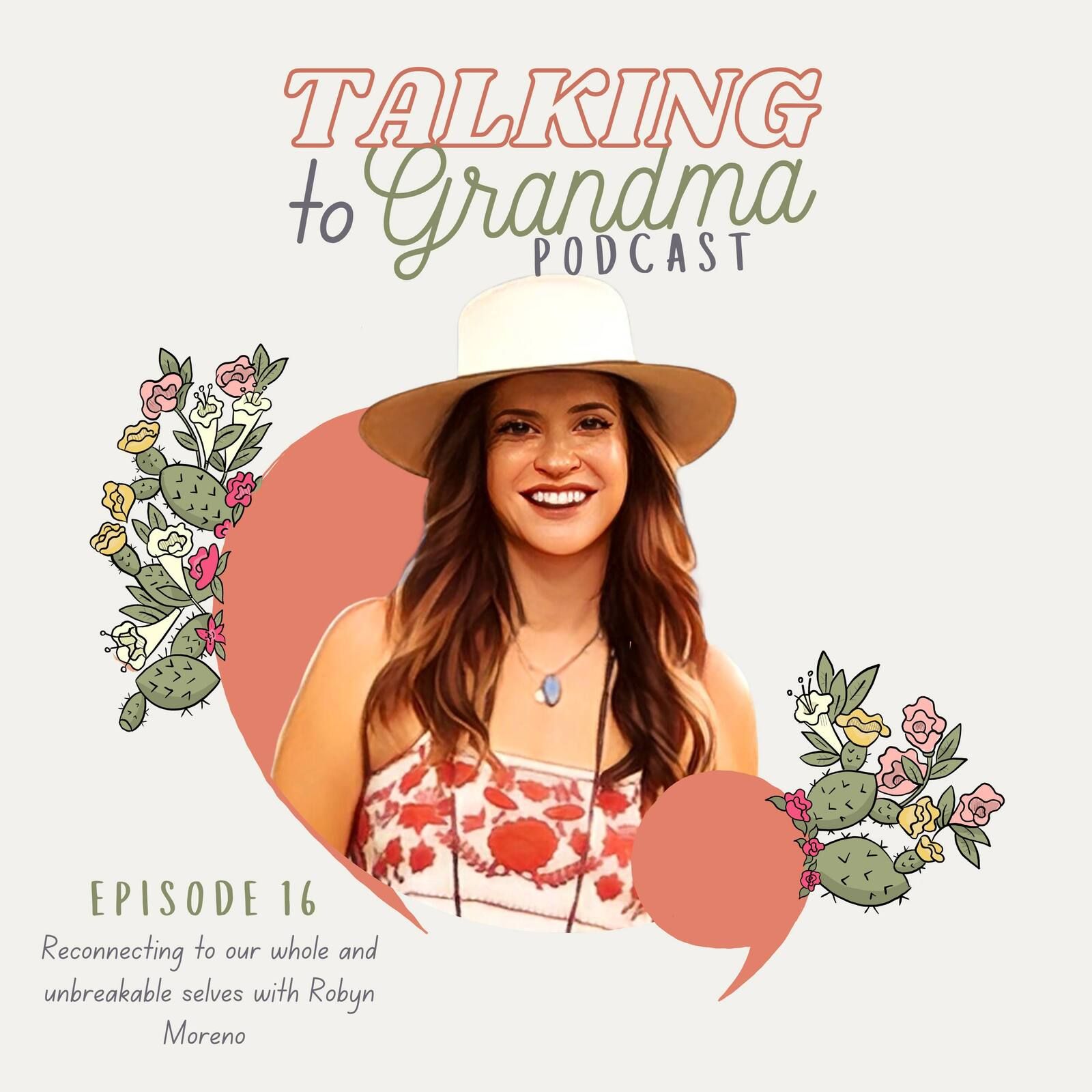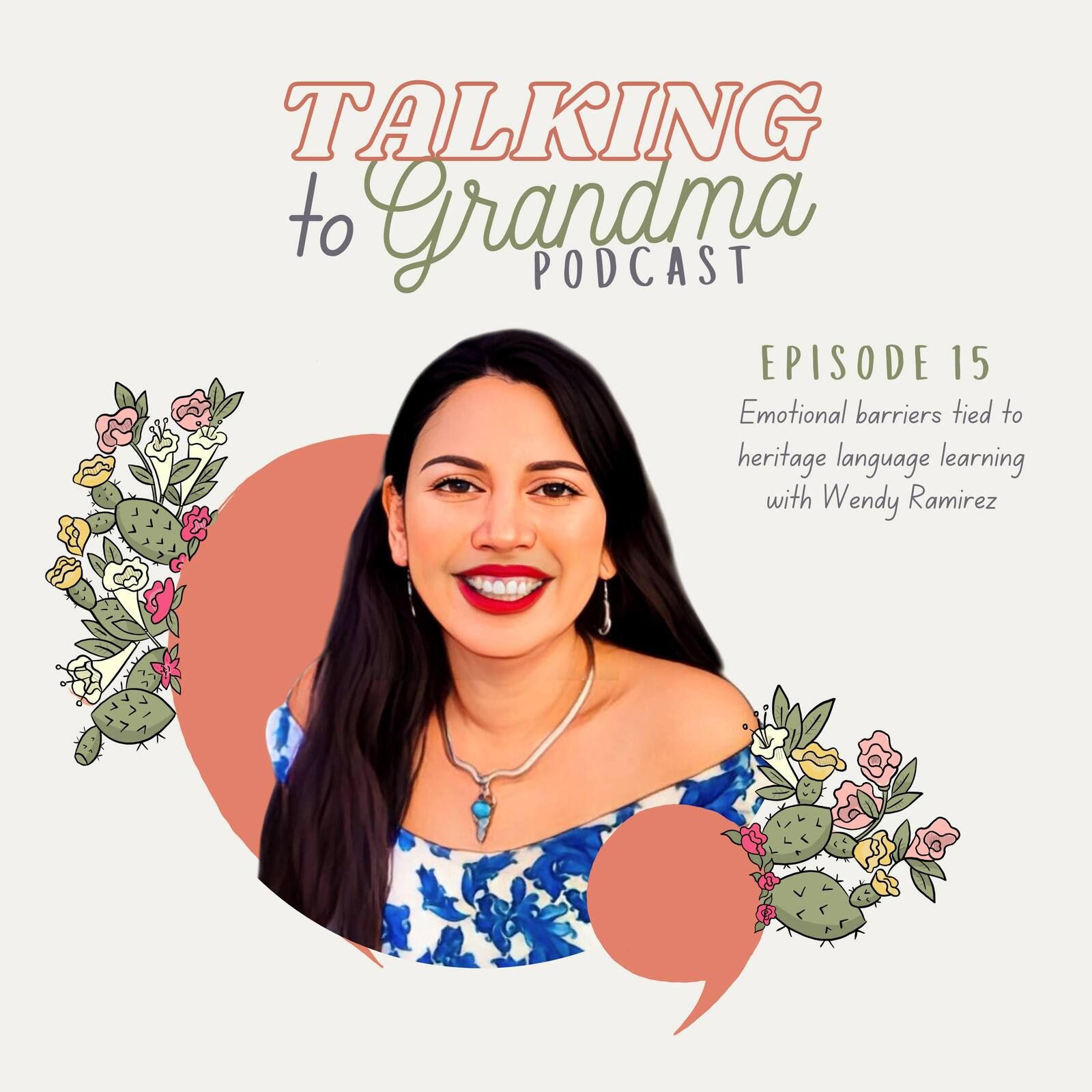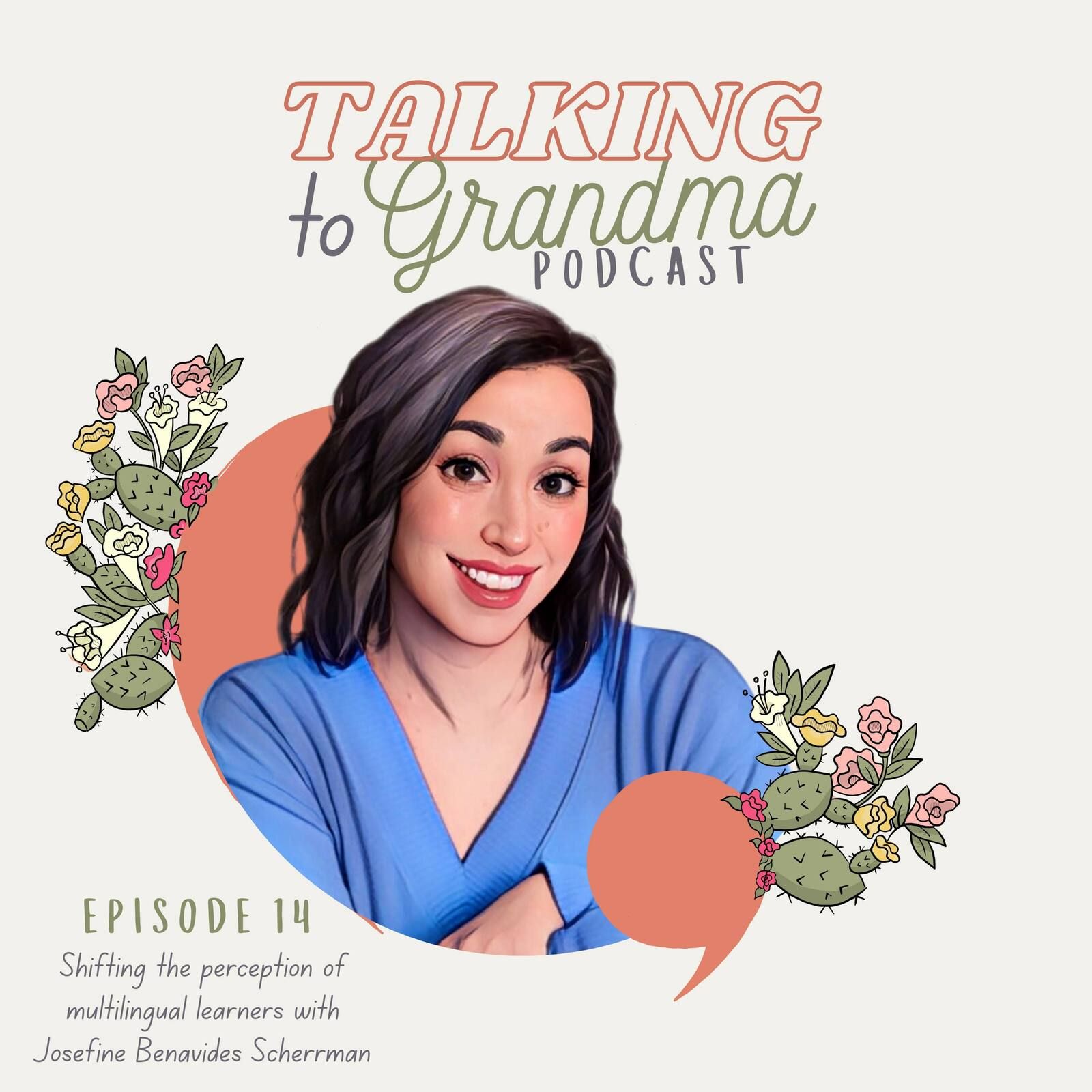Discover Talking to Grandma
Talking to Grandma

Talking to Grandma
Author: Talking to Grandma
Subscribed: 0Played: 9Subscribe
Share
Description
Talking to Grandma is a weekly podcast that elevates stories, science, and strategies to help you raise and teach multilingual and bilingual children. Hosted by Dr. Veronica Benavides, founder and CEO of Bilingual Generation, an organization that helps children with bilingualism in their bones stay connected to their heritage languages and cultures. She's a Harvard-educated doctora who has experienced losing, recovering, and passing on her heritage language to her children. Whether you are a parent, grandparent, teacher, researcher, school leader, or simply someone interested in the topics of language learning and language preservation, this podcast is for you. Through interviews with amazing guests and solo episodes, you will find the resources, guidance, and strategies needed to support you in your journey.
42 Episodes
Reverse
Welcome to Talking to Grandma, a weekly podcast that elevates stories, science, and strategies to help you raise and teach multilingual and bilingual children. Hosted by Dr. Veronica Benavides, founder and CEO of Bilingual Generation, an organization that helps children with bilingualism in their bones stay connected to their heritage languages and cultures.
Today, you’ll hear from the passionate duo Carolyne Crolotte and Gina Rodriguez as they explore the impact of Proposition 227 on bilingual education in California and their work to shift the narrative through the Two Languages, Twice the Opportunities campaign.
Listen as we dispel common myths and share tools and strategies to communicate the many benefits of bilingual education.
Two Languages, Twice The Opportunities Materials
English / Spanish Brochure
English / Chinese Brochure
English Social Media Toolkit
Spanish Social Media Toolkit
Chinese Social Media Toolkit
Learn more:
First5la.org
EarlyEdge California
CAMPAIGN LAUNCH ENCOURAGES DUAL LANGUAGE LEARNING ACROSS L.A. COUNTY
Reading by 9: 3 reasons why language is your child’s secret superpower
Welcome to Talking to Grandma, a weekly podcast that elevates stories, science, and strategies to help you raise and teach multilingual and bilingual children. Hosted by Dr. Veronica Benavides, founder and CEO of Bilingual Generation, an organization that helps children with bilingualism in their bones stay connected to their heritage languages and cultures.
In today’s episode, we speak with the insightful, witty, and humble Conor P. Williams. In our conversation, he shares his research on expanding equitable and multilingual learning opportunities for young, linguistically diverse children in the United States.
Listen to hear us discuss the colonization of dual language programs and the importance of equity and access in these spaces.
Check out these articles:
The Intrusion of White Families Into Bilingual Schools
Ensuring Equitable Access to Dual-Language Immersion Programs: Supporting English Learners’ Emerging Bilingualism
Welcome to Talking to Grandma, a weekly podcast that elevates stories, science, and strategies to help you raise and teach multilingual and bilingual children. Hosted by Dr. Veronica Benavides, founder and CEO of Bilingual Generation, an organization that helps children with bilingualism in their bones stay connected to their heritage languages and cultures.
Today, we speak with the brilliant and funny Mike Alfaro about the impact of assimilation on identity and explore his inspiration for the creation of Millennial Loteria and Sí Sabo Kids.
Mike Alfaro is a Creative Director, Content Creator, and Children’s Book Writer with over 370k followers on social media (@millennialloteria). Recognized as one of TikTok's 2023 Latinx Visionary Voices, he also earned a spot in the inaugural class of the LA Time’s 2022 Vanguardia List—celebrating Latino innovators, instigators, and power players breaking through barriers. His influence extends beyond social media, having been profiled by The New York Times, the Today Show, The Kelly Clarkson Show, Time Magazine, Oprah Magazine, Telemundo, and many more outlets. Originally from Guatemala, he now resides in Los Angeles with his wife Amy, baby Mya, and dog Bugsy.
Tune in to hear Mike emphasize the importance of breaking stereotypes and showcasing the diversity and modernity of the Latine community.
Learn more about Si Sabo Kids on instagram @sisabokids
Learn more about Millennial Loteria on instagram @millennialloteria
Welcome to Talking to Grandma, a weekly podcast that elevates stories, science, and strategies to help you raise and teach multilingual and bilingual children. Hosted by Dr. Veronica Benavides, founder and CEO of Bilingual Generation, an organization that helps children with bilingualism in their bones stay connected to their heritage languages and cultures.
Over the past couple of years, we have been talking with families and educators of kids with bilingualism in their bones through this podcast and our work with Bilingual Generation on our mission to create resources for educators and families that help kids maintain a connection to their heritage languages and cultures. One of our latest resources that has been brewing is The Bili app, a visionary app crafted by our team at Bilingual Generation.
We are back with another episode with the Bili team, who helped bring the visionary app to life. If you missed last week’s episode, make sure you check it out after this!
Today, you will hear from Project director Maried Rivera Nieves, Intern developers Aleksandra Makhrova and Fernando Perez Gutierrez, and Artist Graciella Delgado.
Learn more about Bili and join the waitlist to download later this year: www.thebiliapp.com
Follow Bili on Instagram: @thebiliapp
Welcome to Talking to Grandma, a weekly podcast that elevates stories, science, and strategies to help you raise and teach multilingual and bilingual children. Hosted by Dr. Veronica Benavides, founder and CEO of Bilingual Generation, an organization that helps children with bilingualism in their bones stay connected to their heritage languages and cultures.
Over the past couple of years, we have been talking with families and educators of kids with bilingualism in their bones through this podcast and our work with Bilingual Generation on our mission to create resources for educators and families that help kids maintain a connection to their heritage languages and cultures. One of our latest resources that has been brewing is The Bili app, a visionary app crafted by our team at Bilingual Generation.
Born from collaborations with bilingual educators and families, Bili is a response to the challenges communities face in finding dynamic, culturally responsive tools to support language learning at home and at school.
Over the next two episodes, I will be bringing you a collection of interviews with the people putting together the Bili App.
Today, you will hear from non other than the very Host of Talking to Grandma, Dr. Veronica Benavides as well as chief technology officer, Johnathan Chin and UX designer, Sarah Lynch.
Follow Bili on Instagram: @thebiliapp
Welcome to Talking to Grandma, a weekly podcast that elevates stories, science, and strategies to help you raise and teach multilingual and bilingual children. Hosted by Dr. Veronica Benavides, founder and CEO of Bilingual Generation, an organization that helps children with bilingualism in their bones stay connected to their heritage languages and cultures.
Talking to Grandma host, Dr. Veronica Benavides is returning to SXSW Edu next week to lead a panel alongside Dr. Vanessa Santiago Schwarz called Sí Sabo: Children with Bilingualism in Their Bones Speak. Last summer Armando Orduña and his daughter Giuliana shared their vulnerable conversation about language, identity, and growing up bilingual in America. This conversation and other talks with kids with bilingualism in their bones sparked the inspiration for this panel discussion.
This week, we bring you these inspiring conversations from the archives of Talking to Grandma as we revisit this episode we published last summer.
If you’re heading to SXSW EDU this year, be sure to stop by the panel on Tuesday, March 5th, at 11:30 AM! We hope to see you in Austin!
Welcome to Talking to Grandma, a weekly podcast that elevates stories, science, and strategies to help you raise and teach multilingual and bilingual children. Hosted by Dr. Veronica Benavides, founder and CEO of Bilingual Generation, an organization that helps children with bilingualism in their bones stay connected to their heritage languages and cultures.
In this episode, we explore the vital connection between culture, language, and wellness with Jennifer Velasquez.
Jennifer Velasquez is an illustrator and the founder of Almadé, a wellness company that provides BIPOC women with the tools to heal their inner child and break free from their generational curses. Using her background in adult education and love of neuroscience, Jennifer’s science-based and abuela-approved tools are used by therapists, social workers, and in classrooms across the country. She creates in the Catskill Mountains of New York with her husband Jake and pup Ruthie. For more on her work visit, www.almadeshop.com and connect with her on Instagram @almadeshop.
Join us as she shares how her health led her to discover a side to her heritage language she had yet to uncover and how she plans to bridge generations through her work.
Welcome to Talking to Grandma, a weekly podcast that elevates stories, science, and strategies to help you raise and teach multilingual and bilingual children. Hosted by Dr. Veronica Benavides, founder and CEO of Bilingual Generation, an organization that helps children with bilingualism in their bones stay connected to their heritage languages and cultures.
In this episode, join us as we delve into the enriching conversation with Dorenyse Díaz, exploring the intricate dynamics of language loss and preservation within the context of her Nicaraguan heritage. Díaz sheds light on the challenges and triumphs of maintaining a connection to our cultural and linguistic identities.
Dorenyse Díaz self identifies as a Nicaraguan queer fat femme based out of the ancestral lands of the Tongva and Gabrielino peoples (Los Angeles). She’s a former school leader, first in Northeast LA and then in the Macarthur Park/Pico Union area of Los Angeles. She’s worked as a consultant, teacher, and community organizer and her work has focused on supporting educators, leaders, and entrepreneurs in anti-racism and transformative justice, language justice, disability justice, and inclusive practices. Dorenyse is passionate about decolonizing mental health and healing work, spirituality, queerness, radical body love + acceptance, combatting fatphobia, and addressing anti-Blackness in Latine communities. She is the proud dog mama of Pofi (his name means “best friend” in Nicaraguan Spanish), a 2-year-old Shih Tzu/Terrier mix who loves doing zoomies, playing in the sand but never in water, listening to songs from his favorite show Bluey while on long drives, and taking trips to the fascinating drive-thru car wash. Dorenyse is also a loving tía to her wonderful niece and nephews: Eddie (15), Liam (13), Everly (9), and Ian (5).
Tune in to explore the intersections of language, identity, and healing as we navigate the journey towards affirming and valuing our language and culture.
You can find Dorenyse on Instagram at www.instagram.com/dorenyse
You can learn more about her work at NewSchools Venture Fund here.
Welcome to Talking to Grandma, a weekly podcast that elevates stories, science, and strategies to help you raise and teach multilingual and bilingual children. Hosted by Dr. Veronica Benavides, founder and CEO of Bilingual Generation, an organization that helps children with bilingualism in their bones stay connected to their heritage languages and cultures.
In this episode, Carmen Kynard discusses her journey of embracing and maintaining Black language throughout her life, despite the challenges she faced in academia.
Carmen Kynard is the Lillian Radford Chair in Rhetoric and Composition and Professor of English at Texas Christian University. Her award-wining research, teaching, and scholarship interrogate anti-racism, Black feminist pedagogies, AfroDigital/Black cultures and languages, and the politics of schooling with an emphasis on composition and literacies studies. She traces her research and teaching at her website, “Education, Liberation, and Black Radical Traditions” which has garnered over 2 million hits since its 2012 inception.
Listen to hear Carmen's message of resilience, joy, and the pursuit of a more inclusive and equitable education system.
Here is a link to her current course: http://www.funkdafied.org/
You can also find her on Instagram at: @ckdigidesign
Welcome to Talking to Grandma, a weekly podcast that elevates stories, science, and strategies to help you raise and teach multilingual and bilingual children. Hosted by Dr. Veronica Benavides, founder and CEO of Bilingual Generation, an organization that helps children with bilingualism in their bones stay connected to their heritage languages and cultures.
Today’s episode of Talking to Grandma, we chat with Carlos Torres about Yo Sabo The game and how it has brought together generations and made language learning fun!
Carlos and his partner Jess are the creators of Yo Sabo The Game. They are first generation Mexican - American College graduates from the University of California, Riverside. They both grew up in Latino households but had different experiences growing up. They both continue to want to spread the Spanish Language and to engage those who feel like they need help to learn (or relearn) the language. They both have STEM backgrounds.
Listen to hear about Carlos’ journey and how you can make language learning fun in your home, gatherings and classroom!
Buy Yo Sabo The Game: www.yosabothegame.com
NBC Article: The 'no sabo kids' are pushing back on Spanish-language shaming
Welcome to Talking to Grandma, a weekly podcast that elevates stories, science, and strategies to help you raise and teach multilingual and bilingual children. Hosted by Dr. Veronica Benavides, founder and CEO of Bilingual Generation, an organization that helps children with bilingualism in their bones stay connected to their heritage languages and cultures.
Today we hear from Zara Child, a 17-year-old student and the author of a Singaporean Hokkien language learning book. Although her first language was Mandarin Chinese, and she has formally studied French and English, it is Singaporean Hokkien that has captured her imagination. Through her work, she strives to protect linguistic diversity. Listen to hear Zara’s inspiring story and learn about the book she created, Jiak Ba Beh? A Taste of Singaporean Hokkien: An Introduction to Spoken Singaporean Hokkien.
Learn more about Singaporean Hokkien at Save Sg Hokkien or www.learndialect.sg
You can purchase her book here.
Welcome to Talking to Grandma, a weekly podcast that elevates stories, science, and strategies to help you raise and teach multilingual and bilingual children. Whether you are a parent, grandparent, teacher, researcher, school leader, or simply someone interested in the topics of language learning and language preservation, this podcast is for you. Through interviews with amazing guests and solo episodes, you will find the resources, guidance, and strategies needed to support you in your journey.
We are kicking off Season 3 with a conversation with the formidable Nawal Qarooni. She is a Jersey-City-based educator and writer who supports a holistic approach to literacy instruction education spaces across the country. Drawing on her work as an inquiry-based leader and as a mother, Nawal’s pedagogy is centered in the rich and authentic learning all families gift their children every day. She is the author of Nourishing Caregiver Collaborations: Elevating Home Experiences and Classroom Practices for Collective Care, which is out now! She also serves on the Library of Congress Literacy Awards Advisory Board, which funds powerful literacy programming in the world. You can learn more about her work at NQCLiteracy.org.
Get ready for a thought-provoking discussion with Nawal, where she shares insights from her new book which sheds light on the intersection of cultural and linguistic preservation with literacy.
Resources: https://nqcliteracy.org/caregiver-collaborations/
We love hearing from you! Tell us what you think of the podcast. Email us at hello@bilingualgeneration.com. You can also slide into our DMs on Instagram, @talkingtograndma.
If you are interested in learning more about our workshops and curricular tools for schools serving multilingual and emerging multilingual students, visit our website at www.bilingualgeneration.com or write us at hello@bilingualgeneration.com
We hope you enjoyed season 2 of Talking to Grandma! While our season has ended, we aren’t quite done yet! Keep your ears peeled for some exciting bonus episodes coming your way soon.
And if you haven’t already, please rate, review, and subscribe to our podcast. It costs you nothing and means everything to us - it helps us keep these podcast lights on and helps us bring powerful, important, narrative change work to the world.
We have spent almost two seasons talking with parents and educators of children with bilingualism in their bones, but in this episode, we get to hear very special conversations between a father and his daughter, who are both on the journey to preserve their heritage language. Dr. Armando X. Orguña and his daughter Giuliana Sol Orduña sat down to share what that journey looks like from each of their perspectives.
We each have unique identities that become even more complex when we have mixed heritage. In today’s episode, Henry Yau shares how he heard the question, “What are you?” many times growing up with Chinese & Venezuelan heritage and how the diverse community of Houston welcomed him and continues to inspire his work today!
As a graduate of the University of Houston, Henry has become a seasoned professional in the field of public relations, a passionate advocate for diversity and representation in children's education, and has played a vital role in shaping the experience at the Children's Museum Houston for the past 16 years.
Connect on social media:
LinkedIn: https://www.linkedin.com/in/henryyau
Facebook: https://www.facebook.com/henry.yau.735/
Children's Museum of Houston: www.cmhouston.org
Resources Henry mentioned:
FLIP (Family Involvement Program):
https://www.cmhouston.org/outreach-programs/flip
As many of our listeners know, heritage language learning is hard but made a lot easier when done in community. That is what Anita Sachariah has created with her Instagram account Bhashakids which helps connect the south asian diaspora to their heritage language. In today’s episode, we hear Anita’s story of how she is teaching her kids their heritage languages, even though these languages were nearly lost in her generation. She shares her vast knowledge of language and tips to make it easier to pass on languages to your kids.
Find out more about Anita's work at bhashakids.com
Resources Anita shared:
Bilinguitos
Dr. Lizette B. Suxo (Sooks-so) shared her journey to connect with her Andean culture and learn Aymara, an indigenous language from the region. Like many people trying to learn their indigenous heritage language, she had to dig deep to find resources, which inspired her to create a hub for people looking to connect with their Andean culture.
Dr. Lizette B. Suxo is an accomplished leadership coach. With over 2 decades of leadership in education, Lizette made a pivot in her career when she became a mom. Faced with important language learning decisions with regard to her son, and also in light of a recent rare disease diagnosis, the importance of raising her son as a multilingual global citizen quickly became a top priority. As a traveler of the world, Lizette has often worked to craft bridges between individuals and across communities. Learning the indigenous language of her ancestors has been a parallel learning experience for her as she raises a son who is bilingual and an emerging multilingual learner. After years of leading and learning in schools and school systems in the US and Latin America, Lizette is deeply interested in strengthening her connection to her cultural Andean roots by learning Aymara. While her family has spoken Aymara for centuries, their immigration to the US and Europe has resulted in a generation who does not speak it. Lizette aims to learn Aymara to ensure it does not disappear from her family and, as her teacher- or yatichiri - has said, “to learn our language is the preserve the ways in which our ancestors lived in the world. How they saw, felt, and experienced the world. How they made sense of it. If we lose our language, we lose that important vision and perspective.” Lizette is determined to strengthen her knowledge of Aymara so that she can build this connection with her mom (a native speaker) and her son, too.
The Ayllu is an online virtual Adinx community for those looking to connect with Aymara and Quechua resources and people in the U.S. and abroad). Their website will go live on June 21st, which is the Aymara New Year or Wilkakuti (the 'Return of the Sun,' in Aymara)
IG: @the_ayllu
Aymara language resources (Lizette's 'yatichiri's (teacher's) page)
FB: https://www.facebook.com/aymaryatiqana
IG: @elis.ajata.rivera
Quechua community resources IG: @quechuaproject
UNESCO article on Aymara: https://courier.unesco.org/en/articles/aymara-has-not-said-its-last-word
Over the years, we disconnect from ourselves, our ‘ser’, the person we are before society and family and insecurities tell us who to be. This can mean losing language and culture from our lives. In this episode, we talk with Robyn Moreno about her new book, Get Rooted, and what it means to find our way back to our whole and unbreakable selves.
Visit RobynMoreno.com for free meditations, to sign up for her newsletter, and check out upcoming events and offerings.
If you are a long-time podcast listener, you likely know that the emotional barriers tied to a heritage language can cause pressure or stress that non-heritage language learners don’t experience. In this episode, Wendy Ramirez shares the complexity of language as it's tied to our identity and navigating the barriers of shame.
Learn more about Spanish Sin Pena at www.spanishsinpena.com or @spanishsinpena on social media!
Over the past decade, we’ve seen a shift in schools' perception of multilingual learners. Things like changing our language from “English Language Learner” to “emergent multilingual student” shows how we are moving from a singular focus on English acquisition to a more holistic approach to bilingualism and biliteracy.
In this episode, we dig into that conversation with bilingual educator and specialist Josie Scherrman - in addition to being an amazing educator, she is also my sister! She talked with us about her journey to reclaim her heritage language, Spanish, and how she is now cultivating learning environments that value and encourage students in their home language.
























